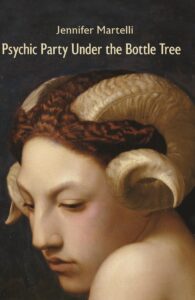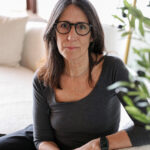Poet Jennifer Martelli is here today and we’re chatting about her new book, Psychic Party Under the Bottle Tree.

Bio:
Jennifer Martelli has received fellowships from The Virginia Center for the Creative Arts, Monson Arts, and the Massachusetts Cultural Council. Her work has appeared in The Academy of American Poets Poem-A-Day, Poetry, Best of the Net Anthology, Braving the Body Anthology, Verse Daily, Plume, The Tahoma Literary Review, and elsewhere. She is the author of Psychic Party Under the Bottle Tree, The Queen of Queens, which won the Italian American Studies Association Book Award and was shortlisted for the Massachusetts Book Award, and My Tarantella, which was also shortlisted for the Massachusetts Book Award and named finalist for the Housatonic Book Award. Jennifer Martelli is co-poetry editor for MER.
What do you enjoy most about writing poems?
I love the physical feeling of finding the music in a poem. I’m not only talking about writing in form, though there is utter satisfaction in completing, say, a sestina. I’m referring more to syntactic music on the line. Those moments–and they are hard-won–when I can feel the rhythm synching with the meaning, well, nothing beats that! But sitting down to an empty page is terrifying: what if I don’t find the music? what if I’ve already written my last poem? This is why revision is much more enjoyable to me. I love wrestling with the lines and the images, breaking open things!
Can you give us a little insight into a few of your poems – perhaps a couple of your favorites?
Here are a few poems from my latest collection that I really kind of love (and loved writing):
“Ceruse,” “Moon Jellyfish,” “Byssed y Cwn.”
What form are you inspired to write in the most? Why?
My favorite form is the sonnet; there’s something so perfect and muscular about the Petrarchan sonnet, especially. Lately, I’ve been incorporating the 14 lines with the epistolary form. Letter poems are so subversive! It’s like we (the reader) are snooping! My most recent chapbook is made up of all epistolary and “to” poems.
What type of project are you working on next?
I have two projects underway. The first is a collection that relies heavily on the epistolary form; it’s also very political and was influenced by the Trump administration and the overturning of Roe. The second project is ekphrastic; these are poems that respond to the 2018 film, Suspiria. I was really motivated to write this after reading Dorothea Lasky’s brilliant collection, The Shining.
When did you first consider yourself a writer / poet?
Ah, this is tough. So I took a very long “hiatus” from writing after I received my MFA from Warren Wilson in 1995. I had kids, took care of my ailing parents, taught a few courses here and there, but I pretty much left the scene by the early 2000s and didn’t return until about 2013. I’d say that’s when I considered myself a writer/poet: I was once again in a writing community, I was sending work out, I was supporting other poets, and I was writing and revising my work!

How do you research markets for your work, perhaps as some advice for not-yet-published poets?
When I came back to writing, in 2013, the whole market had changed! So my first bit of advice would be to find a good database of poetry journals. Duotrope is good, Chill Subs, the Pushcart list, too. There are a lot to choose and some are free! Another good way to research is to look at the acknowledgement page of a collection you like; see where your favorite poet has published.
After that, make it a weekly habit to submit work (even if it’s to one journal) a week. Sunday is my submitting day.
Don’t be afraid of rejections; we all get them!
What would you say is your interesting writing quirk?
I used to only be able to write on yellow legal pads. That’s changed, but I find it hard to write a draft in an unlined journal. I also can’t write in a little journal. I can’t write in pencil or blue ink.
As a child, what did you want to be when you grew up?
A writer, or a spy!
Anything additional you want to share with the readers?
Nothing is off-limits when writing a poem; no topic, no image. I heard Claudia Rankine say, when asked about writing political poetry: “I write what I write. Anything else is another conversation.”
Oooh I loved that!
Links:
Website | Facebook | Instagram | Twitter/X | Buy link | Dear Justice chapbook
